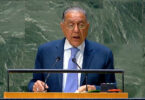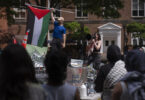BAGHDAD (Reuters): Hundreds of protesters stormed the Swedish embassy in Baghdad in the early hours of Thursday morning and set it on fire in continuing protest against the burning of a Qur’an in Sweden.
Thursday’s protest was called by supporters of Shiite cleric Muqtada Sadr in anticipation of another reported plan to burn the Muslim holy book in Sweden, according to posts in a popular Telegram group linked the influential cleric and other pro-Sadr media.
Media have reported police in Stockholm have granted approval for a protest outside the Iraqi embassy where another Qur’an burning demonstration is planned.
Swedish embassy officials in Baghdad did not immediately respond to requests for comment.
A series of videos posted to the Telegram group, One Baghdad, showed people gathering around the embassy around 1 a.m. on Thursday (2200 GMT on Wednesday) chanting pro-Sadr slogans and storming the embassy complex around an hour later.
The videos showed dozens of men climbing over the fence at the complex, with the sound of them trying to break down a front door. Another showed what appeared to be a small fire being set. Other footage showed men, some shirtless in the summer heat, inside what appeared to be a room at the embassy, an alarm audible in the background.
Others later performed predawn prayers outside of the embassy.
Iraq’s Foreign Ministry issued a statement condemning the attack.
“The Iraqi government has instructed the competent security authorities to conduct an urgent investigation and take the necessary security measures in order to uncover the circumstances of the incident and identify the perpetrators of this act and hold them accountable according to the law,” the Foreign Ministry said.
Iraqi police and state media did not immediately acknowledge the attack.
“We condemn all attacks on diplomats and staff from international organizations,” the Swedish Foreign Ministry in Stockholm said in a separate statement.
The demonstrations began after a man had planned, under police protection, to burn a copy of the Qur’an and the Torah, the Jewish holy book, outside of the Israeli Embassy in Stockholm. However, the man reportedly had abandoned his plan amid the widespread outrage.
The right to hold public demonstrations is strong in Sweden and protected by the constitution. Blasphemy laws were abandoned in the 1970s.
For Muslims, the burning of the Qur’an represents a blasphemous desecration of their religion’s holy text. Qur’an burnings in the past have sparked protests across the Muslim world, some turning violent. In Afghanistan, the Taliban have suspended all the activities of Swedish organizations in the country in response to the recent Qur’an burning.
An Iraqi Christian immigrant last month burned a Qur’an outside a Stockholm mosque during the major Muslim holiday of Eid Al-Adha, triggering widespread condemnation in the Islamic world. A similar protest by a far-right activist was held outside Turkiye’s Embassy earlier this year, complicating Sweden’s efforts to convince Turkiye to let it join NATO.
In June, protesters stormed the embassy in Baghdad during daylight hours over that Qur’an burning. Another day of protests saw thousands of demonstrators on the streets in the country. Protesters then, as well as early Thursday, called on Iraqi officials to expel Sweden’s ambassador to Iraq.
Late last month, Sadr called for protests against Sweden and the expulsion of the Swedish ambassador after an Iraqi man burned a Qur’an outside a mosque in Stockholm.
Two major protests took place outside of the Swedish embassy in Baghdad in the aftermath of that Qur’an burning, with protesters breaching the embassy grounds on one occasion but not entering the embassy building itself.
The government of several Muslim countries, including Iraq, Turkiye, the United Arab Emirates, Jordan and Morocco issued protests about the incident.
The United States also condemned it, but added that issuing the permit supported freedom of expression and was not an endorsement of the action.







